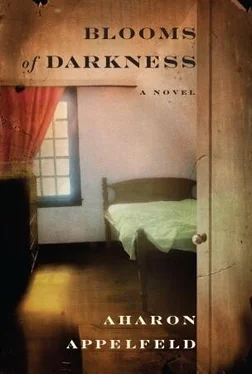Hugo’s mother speaks more and more about Mariana. Mariana lives outside of the town, and they will apparently make their way to her through the sewer pipes. The pipes are wide, and after midnight little sewage runs in them. Hugo’s mother tries to speak in her ordinary tone of voice, and from time to time she gives it a tinge of adventure. Hugo knows she is doing that to calm him down.
“Where is Otto?”
“I assume that he’s also hiding in a cellar.” His mother speaks curtly.
Since his mother told him they would make their way to Mariana through the sewer pipes, Hugo has been trying to recall her face from his memory. His efforts evoke only her height and long arms, which hugged his mother at the meetings when he was present. Those meetings were mostly fleeting. His mother would give her two packages, and Mariana would hug her warmly.
“Does Mariana live in the country?” Hugo gropes in this new darkness.
“In a village.”
“Will I be able to play outside?”
“I don’t think so. Mariana will explain everything to you. We’ve been friends ever since we were girls. She’s a good woman, but fate hasn’t been kind to her. You will have to be very disciplined and do exactly what she tells you to.”
What is the meaning of “fate hasn’t been kind to her”? Hugo wonders. It is hard for him to imagine that tall, pretty woman dejected or humiliated.
His mother repeats, “Everyone has his own fate.”
That sentence, like the one before, is inscrutable.
Meanwhile, Hugo’s mother takes a knapsack and a suitcase down into the cellar. She places books in the knapsack, and the chess set and the dominoes. She packs clothes and shoes in the suitcase. It is stuffed and heavy.
“Don’t worry. Mariana will take care of everything. I spoke with her. She liked you,” his mother says with a trembling voice.
“And where will you go, Mama?”
“I’ll look for a hiding place in the nearby village.”
His mother has stopped reading the Bible to him, but after Hugo puts out the lantern, he hears her calling to him. Her voice is soft, melodious, and penetrating.
“You must behave like a grown-up,” his mother says, not sounding like herself. Hugo wants to reply, I’ll do everything that Mariana tells me to do , but he stops himself.
At night sounds come from outside and shock the cellar. They are mainly the sobbing of women whose children were snatched away from them. The women were daring and ran after the gendarmes, pleading with them to return their children. The pleas drove the gendarmes mad, and they beat the women furiously.
After the kidnappings, silence reigns. Only here and there a suppressed sob is heard.
Hugo lies awake. Everything that happens in the house and in the street affects him. An expression that he heard by chance returns to him at night with intensified clarity. It is hard for him to read and hard for him to play chess. Images and sounds fill him.
“Where is Otto?” he keeps asking his mother.
“In a cellar.”
Hugo is sure that Otto, too, has been snatched, thrown into a truck, and is now on his way to the Ukraine.
His mother sits with her legs crossed and describes the place where Mariana lives. “She has a big room and within it is a big closet. In the daytime, you’ll be in the big room, and at night you’ll sleep in the closet.”
“At Mariana’s, are they also liable to seize me?” Hugo asks cautiously.
“Mariana will watch over you like a hawk.”
“Why will I have to sleep in the closet?”
“For safety’s sake.”
“Will she read out of the Bible for me?”
“If you ask her.”
“Does she know how to play chess?”
“I imagine not.”
The short questions and answers sound to Hugo like final preparations for a secret journey. Sitting in the cellar oppresses him, and he is eagerly looking forward to the day when he’ll put the knapsack on his back and go down into the sewer with his mother.
“Is there a school there?” he suddenly asks.
“My dear, you aren’t going to go to school. You have to be in hiding,” his mother says in a different tone of voice.
That sounds like a punishment to him, and he asks, “Will I be in hiding all the time?”
“Until the end of the war.”
He is relieved. The war, he has heard, will not be long.
Hugo’s questions, asked as he gropes blindly, pain his mother. Usually she answers with a complete sentence or gives half an answer, but she doesn’t deceive him. She has a rule: never deceive. But there were times, to admit the truth, when she blurred things, distracted him, and concealed facts from him. For that reason, her conscience bothers her. To overcome her twinges of conscience, she says, “You must be aware, listen to everything that’s said, and understand that we’re living in strange times. Nothing is the way it was.”
Hugo feels that his mother is distressed, and he says, “I’m listening, Mama. I listen all the time.”
“Thanks, dear,” his mother answers. She has been feeling recently that she has lost control over her words. They slip out of her mouth and don’t touch on the main point. For example, she wants to tell Hugo about Mariana and her profession, so that he will know and be careful, but all the words she tries to mobilize don’t help her.
“Excuse me,” she says suddenly.
“What for, Mama?”
“Nothing. My mistake,” she says, and she covers her mouth with a handkerchief.
Again Hugo is ill at ease. It seems to him that his mother wants to tell him a big secret, but that for some reason she is hesitating. That hesitation makes him talk too much and repeat things he’s already told her.
“Does Mariana have children?” Hugo tries a different approach.
“She isn’t married.”
“What does she do?”
“She works.”
To conclude the interrogation, she says, “There’s no reason to ask so many questions. I repeat, Mariana is a good woman. She’ll watch over you like a hawk. I trust her.”
This time Hugo is insulted, and he says, “I won’t ask.”
“You’re allowed to ask, but you have to realize that there isn’t an answer to every question. There are things that it’s impossible to explain, and there are things that a boy of your age can’t understand.” To console him a bit, she adds, “Believe me, everything will be clear to you. In a short while you’ll understand a lot of things. You’re a smart boy, and even without answers, you’ll understand.” His mother opens her eyes wide, and they both smile.
The night finally came. It was preceded by a day of house-to-house searches, kidnappings, and cries of dread. The noose was getting tighter, and his mother decided that after midnight they would set out. All the days in the cellar, Hugo didn’t feel afraid. Now, as he is on his knees and stuffing the books back into the knapsack, his hands tremble.
“Did we forget anything?” asks his mother, the way she used to ask before they went on vacation.
It’s one in the morning, and they walk up the steps in the dark house. Through the darkness Hugo can see his room — the desk, the dresser, and the bookcase. His schoolbag lies at the foot of the desk. I won’t be going to school anymore —the thought passes through his head.
Hugo’s mother hastily puts a few small things in a handbag, and they go out the back door into the street. The street is dark and silent, and they cling to the walls as they walk, to avoid discovery. Near what was once the bakery is the manhole. Hugo’s mother pulls up the cover and goes down. Hugo throws her the suitcase and the knapsack. He immediately dangles his legs down, and his mother takes him in her arms. Luckily for them, the sewage isn’t deep at that hour, but the stench and the stifling air slow them down. Hugo knows that quite a few people have been caught coming out of the sewers. His mother assumed that on a Sunday night the guards would be drunk, and they wouldn’t leave the ghetto to lie in wait for people running away. From time to time the level of the sewage rises, and the air grows more stifling. While they are trudging along, Hugo collapses. His mother doesn’t lose her wits. She drags him, and in the end she pulls him out. When he opens his eyes, he is lying on grass.
Читать дальше












